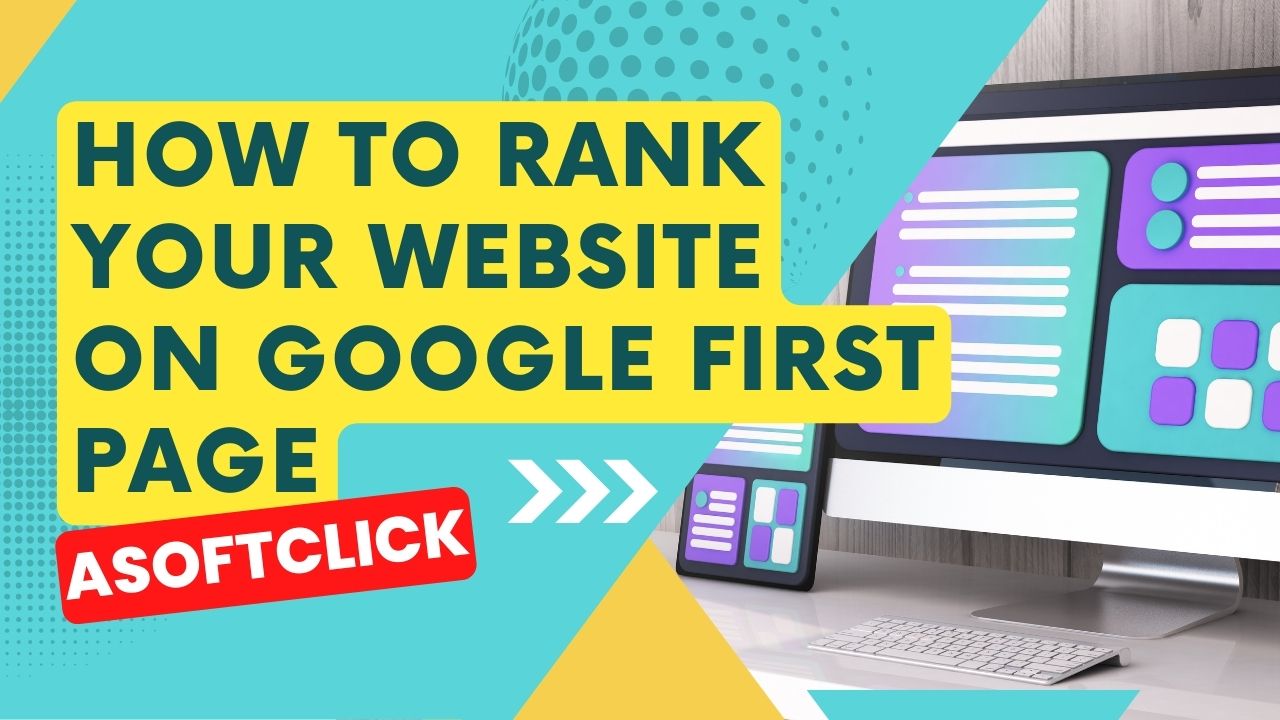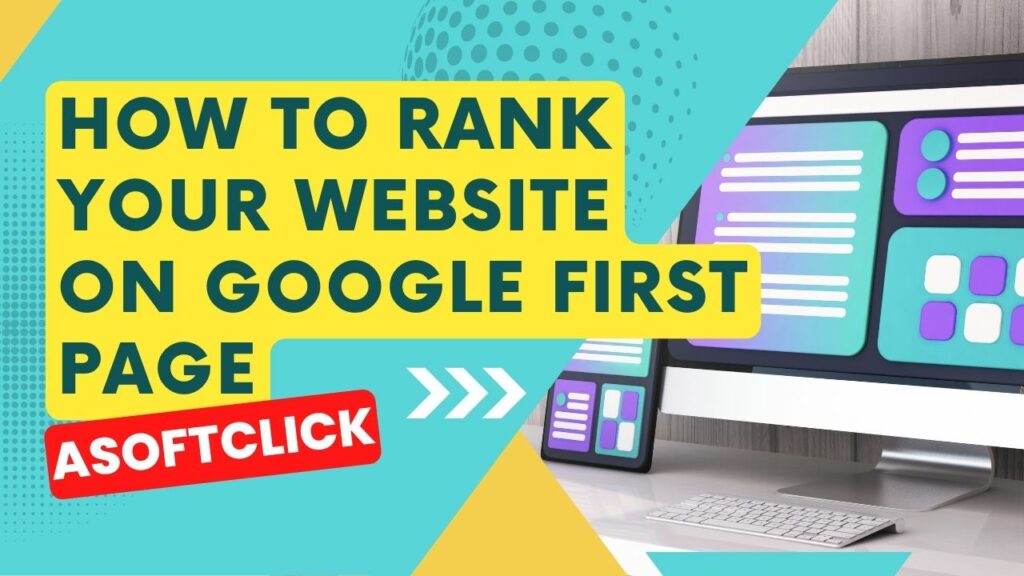 With the advancement of technology today, it is important for businesses and individuals to have a strong online presence. One of the best ways to do this is by ranking your website and being on the top of the results when people use a search engine, like Google search. In this article, we will discuss how to rank a website on Google first page.
With the advancement of technology today, it is important for businesses and individuals to have a strong online presence. One of the best ways to do this is by ranking your website and being on the top of the results when people use a search engine, like Google search. In this article, we will discuss how to rank a website on Google first page.
We will help you significantly enhance visibility, increase organic traffic, and most of all, drive your business success. We will discuss the effective ways and best practices to help rank your website in search engines.
Why the first page of Google is important
According to studies, the majority of search engine users such as Google search rarely reach the second page when they search the internet. In fact, it is estimated that over 95% of all search traffic goes to websites listed on the first page. This statistic highlights the significance of securing a prominent position in search engine rankings.
Being featured on the first page of Google offers several key advantages:
- It significantly increases visibility and exposure to a wider audience. As users typically trust search engines to deliver relevant and reliable results, appearing on the first page lends credibility to your website or business. This, in turn, enhances brand recognition and establishes a sense of authority in your industry.
- Securing a place on the first page can lead to a substantial boost in organic traffic. Higher rankings result in increased click-through rates, as users are more likely to click on websites positioned at the top of the search results. Greater organic traffic translates into a higher potential for conversions. Whether that means generating leads, making sales, or achieving any other desired goal.
- Ranking on the first page of Google enables you to stay ahead of your competitors. With numerous businesses vying for attention, securing a top spot allows you to outshine your competitors and capture a larger share of the market. By occupying prime real estate on the search engine results page, you effectively position yourself as a go-to resource and gain a competitive edge.
You might also like: Voice Search Optimization: How AI Can Help Improve Your SEO
How does first-page ranking benefit your business?

Securing a first-page ranking on search engines like Google can bring numerous benefits to your business. Here are some key ways in which first-page ranking can benefit your business:
- Increased Visibility: Ranking on the first page ensures that your website is highly visible to users who are searching for relevant keywords and phrases related to your business. This increased visibility exposes your brand to a larger audience and boosts brand recognition.
- Higher Organic Traffic: Appearing on the first page of search results leads to a significant increase in organic traffic. Users tend to click on the top-ranking websites, resulting in higher click-through rates and more visitors to your site. This increased traffic provides a greater opportunity to engage potential customers and drive conversions.
- Enhanced Credibility and Trust: Ranking on the first page of Google lends credibility and trustworthiness to your business. Users often perceive top-ranked websites as more reputable and authoritative. This positive perception can have a significant impact on user behavior. As they are more likely to trust and engage with your brand.
- Competitive Advantage: Securing a first-page ranking gives your business a competitive edge. Outranking your competitors allows you to capture a larger share of the market and attract customers who might have otherwise chosen your competitors. This advantage can lead to increased market visibility, customer acquisition, and ultimately, business growth.
- Cost-Effective Marketing: Ranking organically on the first page of search results provides a cost-effective marketing strategy. While paid advertising can be effective, organic rankings offer a long-term, sustainable solution that does not require continuous investment. Once you achieve a high-ranking position, you can continue to enjoy the benefits without ongoing advertising expenses.
- Higher Conversion Rates: Quality traffic driven by first-page rankings tends to have higher conversion rates. When users find your website through organic search results, they are often actively seeking information or solutions related to their search query. This targeted traffic increases the likelihood of conversions. Whether it’s making a purchase, filling out a form, or any other desired action.
How to Rank a Website on Google first page

1. Make sure your page aligns with search intent
Ensuring that your web page aligns with search intent is vital for both user satisfaction and search engine optimization. When a user performs a search, they have a specific intent in mind, whether it’s seeking information, making a purchase, or finding a solution to a problem. By understanding and catering to this intent, you can create content that directly addresses the user’s needs.
To align your page with search intent, start by analyzing the search queries related to your target keywords. Look for patterns and common themes to understand the underlying intent. For example, if users are searching for “best running shoes,” their intent is likely to find product recommendations or reviews. In this case, your page should provide detailed information about the top running shoes on the market. Focus on creating high-quality, relevant content that directly matches what users are looking for.
Additionally, consider the format and structure of your page. If the search intent suggests that users are seeking quick answers or step-by-step guides, format your content accordingly. Use headings, bullet points, and concise explanations to make it easy for users to find the information they need. By aligning your page with search intent, you improve the user experience, increase the likelihood of higher rankings, and attract targeted traffic that is more likely to engage with your content and achieve your business goals.
You might also like: The Power of Social Media Analysis with AI: A Beginner’s Guide
2. Let Google Know Immediately that Your Website Exists
Getting your website indexed by Google as soon as possible is essential to ensure its visibility in search results. Here are a couple of ways to let Google know about your website immediately:
- Submitting your sitemap: A sitemap is a file that provides a structured overview of all the pages on your website. By submitting your sitemap to Google Search Console, you can expedite the indexing process. Google Search Console is a free tool that allows webmasters to monitor and optimize their website’s performance in Google search results. Once you’ve set up an account, you can submit your sitemap to inform Google about the structure and content of your website. This helps Google’s crawler discover and index your pages more efficiently.
- Fetch as Google: In addition to submitting your sitemap, you can use the “Fetch as Google” feature in Google Search Console to expedite the indexing process for specific pages. This feature allows you to manually request Google to crawl and index a particular URL on your website. By entering the URL and clicking the “Fetch” button, you prompt Google to fetch and render the page, making it more likely to be indexed quickly. This is particularly useful when you have new or updated content that you want to ensure is indexed promptly.
By utilizing these methods, you can notify Google about your website’s existence promptly and increase the chances of your pages being indexed and appearing in search results sooner. It’s important to note that while these steps can help speed up the indexing process, it may still take some time for Google to fully crawl and index all the pages on your website.
3. Make sure your page covers the topic in full
When creating content for your web page, it is crucial to cover the topic in full to provide comprehensive and valuable information to your audience. Here are a few reasons why ensuring comprehensive coverage is important:
- User Satisfaction: By covering the topic in full, you satisfy the user’s search intent and provide them with the information they are looking for. Users appreciate detailed and thorough content that answers their questions, addresses their concerns, or provides solutions to their problems. When your page offers comprehensive coverage, it enhances the user experience and establishes your website as a reliable and authoritative source of information.
- Improved SEO Performance: Search engines aim to deliver the most relevant and comprehensive results to users. When your page covers the topic in full, it signals to search engines that your content is valuable and informative. This can positively impact your SEO performance, as search engines are more likely to rank your page higher in search results. Additionally, comprehensive content often leads to longer dwell times, lower bounce rates, and increased engagement, all of which are favorable signals for search engines.
To ensure your page covers the topic in full, conduct thorough research to gather all relevant information, statistics, and examples related to the subject. Structure your content in a logical and organized manner, using headings, subheadings, and bullet points to enhance readability. Include supporting visuals such as images, graphs, or videos where appropriate. Additionally, consider addressing different aspects or perspectives of the topic to provide a well-rounded view. By covering the topic comprehensively, you provide value to your audience and increase the chances of attracting and retaining visitors to your website.
4. Choose the Right Keywords to Target
Selecting the right keywords to target is a fundamental aspect of search engine optimization (SEO) and can greatly impact the visibility and success of your website. Here are a few key considerations to help you choose the right keywords:
- Relevance to your Content: Focus on keywords that are highly relevant to the content of your web page. Consider the main theme or topic you want to rank for and identify keywords that accurately reflect it. For example, if you have a blog post about “healthy vegan recipes,” targeting keywords like “vegan recipes,” “plant-based meals,” or “healthy vegan cooking” would be relevant.
- Search Volume and Competition: Evaluate the search volume and competition for keywords you’re considering. Higher search volume indicates that more users are searching for those terms, but it also means more competition. Strike a balance by targeting keywords with a decent search volume while considering your website’s authority and competitiveness in the market.
- Long-tail Keywords: Long-tail keywords are more specific phrases that usually have lower search volume but can bring targeted traffic. These keywords often indicate a higher level of user intent and may lead to better conversion rates. For example, instead of targeting “running shoes,” you could focus on “best lightweight running shoes for marathon training.”
- User Intent: Consider the intent behind the keywords you choose. Are users looking for information, products, or local services? Understanding user intent will help you align your content with what users are searching for and deliver value to them. This can also guide you in creating content that matches different stages of the buyer’s journey.
- Keyword Research Tools: Utilize keyword research tools such as Google Keyword Planner, SEMrush, or Moz Keyword Explorer to identify relevant keywords, analyze search volume, competition, and discover related keywords. These tools provide valuable insights that can inform your keyword targeting strategy.
5. Make sure your page is optimized for on-page SEO
Optimizing your page for on-page SEO is crucial for improving its visibility and ranking in search engine results. To ensure effective on-page optimization, focus on key elements such as optimizing title tags, meta descriptions, and headings with relevant keywords. Make sure to include descriptive and unique content that provides value to your audience while naturally incorporating keywords throughout. Utilize proper URL structures, optimize image alt text, and enhance the overall user experience by improving page load speed and mobile-friendliness. Additionally, internal linking and external linking to reputable sources can further enhance your page’s SEO. By implementing these on-page optimization techniques, you increase the chances of search engines understanding your content and delivering it to the right audience, leading to improved rankings and increased organic traffic.
6. Check Your Competitors
Checking your competitors is a critical step in any business strategy, including digital marketing and SEO. By analyzing your competitors, you gain valuable insights into their strategies, strengths, and weaknesses, allowing you to identify opportunities and refine your own approach. Evaluate their website content, keywords they are targeting, backlink profiles, and social media presence. Understand their unique selling points and how they engage with their audience. This competitive analysis helps you benchmark your performance. As well as identify areas for improvement, and develop a solid plan to differentiate yourself in the market. By keeping a close eye on your competitors, you can stay ahead of industry trends, adapt your strategies accordingly, and maintain a competitive edge in the digital landscape.
7. Make sure your page is internally linked
Implementing internal linking on your web page is crucial for optimizing its structure and improving user experience, as well as enhancing SEO. By strategically linking relevant pages within your website, you provide clear navigation paths for users, enabling them to easily explore related content. Internal linking also helps search engine crawlers discover and index your pages more effectively, boosting the overall visibility and ranking potential of your website. Ensure that your internal links are descriptive and contextually relevant, using anchor text that includes targeted keywords where appropriate. By incorporating internal linking into your page, you can improve site navigation, encourage deeper engagement, and enhance the overall SEO performance of your website.
You might also like: Unlocking the Potential: 15 Best Software Business Ideas for 2023
8. Manage Your Meta Tags Well
Managing your meta tags effectively is crucial for optimizing your website’s visibility and click-through rates in search engine results. Meta tags, such as title tags and meta descriptions, provide concise and informative summaries of your web pages to search engines and users. Ensure that your title tags accurately describe the content of each page while incorporating relevant keywords to improve search engine rankings. Craft compelling meta descriptions that entice users to click through to your website by highlighting the value and relevance of your content. Additionally, keep your meta tags unique for each page, avoiding duplication, and maintaining consistency with the actual content on the page. By managing your meta tags well, you can enhance the visibility, clickability, and overall SEO performance of your web pages.





